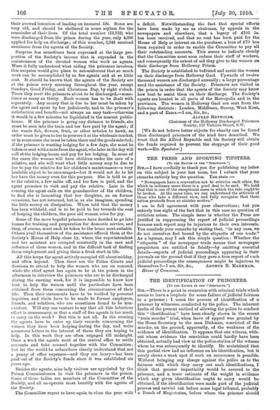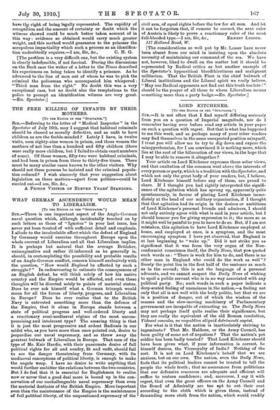THE IDENTIFICATION OF PRISONERS.
[To THE EDITOR OP THE " SPECTATOR."]
Sin,—There is a point in connexion with criminal trials which seems to leave a loophole for some failure of judicial fairness to a prisoner ; I mean the process of identification of a. prisoner by witnesses, conducted by the police. The inherent faults of the present method of allowing the police to conduct this " identification" have been clearly shown in the recent "train murder" trial, when leave of appeal was granted by the Home Secretary to the man Dickman, convicted of the murder, on the ground, apparently, of the weakness of the evidence of identification. It appears that one witness, with- out whose evidence the conviction could hardly have been obtained, actually had view at the police-station of the witness whom he was subsequently to identify. He maintained that this partial view had no influence on his identification, but it surely shows a weak spot if such an occurrence is possible. Without bringing any charge against the police as to the fairness with which they carry out such identifications, I think that greater impartiality would be assured to the prisoner, and a truer estimate of the weight in evidence which any given identification ought to carry would be obtained, if the identification were made part of the judicial process and carried out before some legal tribunal, probably a Bench of Magistrates, before whom the prisoner should have the right of being legally represented. The rapidity of recognition and the amount of certainty or doubt which the witness showed could be much better taken account of in this way : evidence so obtained .would carry much greater weight, and this method would guarantee to the prisoner the scrupulous impartiality which such a process as an identifica-
tion undoubtedly requires.—I am, Sir, &a., C. H. G.
[The problem is a very difficult one, but the existing system is clearly indefensible, if not farcical. During the discussions on the Beck case the writer of a letter to the Times described his experiences on being taken to identify a prisoner. As he advanced to the line of men out of whom he was to pick the criminal the policeman who accompanied him whispered : "'Third man from the right." No doubt this was a very exceptional case, but no doubt also the temptations to the police to prompt an identification witness are very great. —ED. Spectator.]







































 Previous page
Previous page